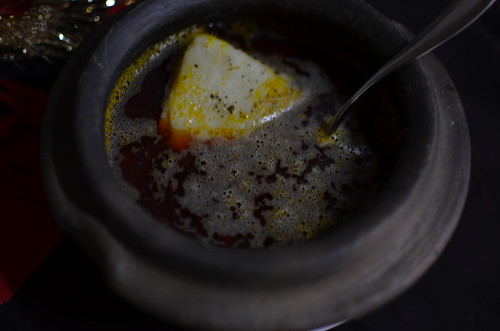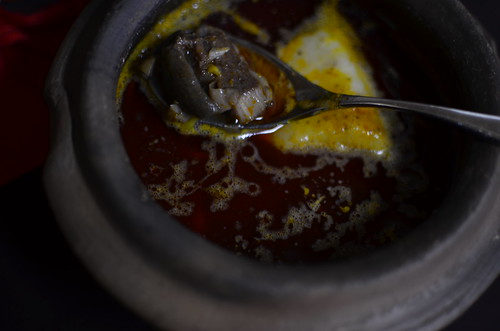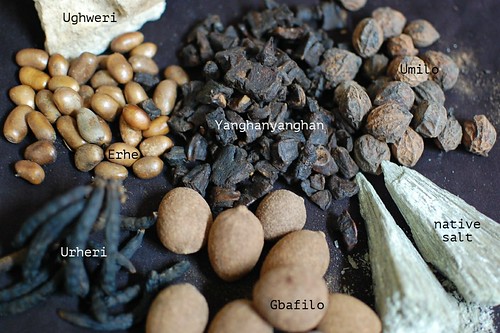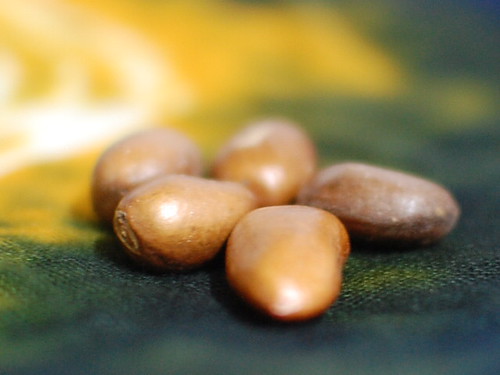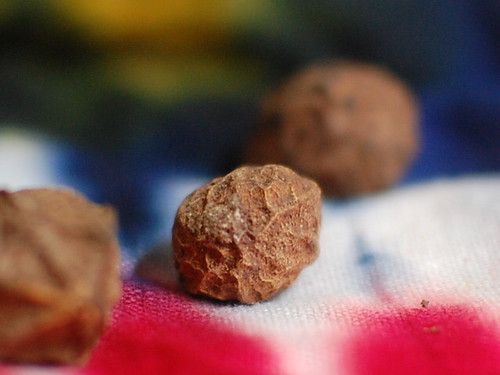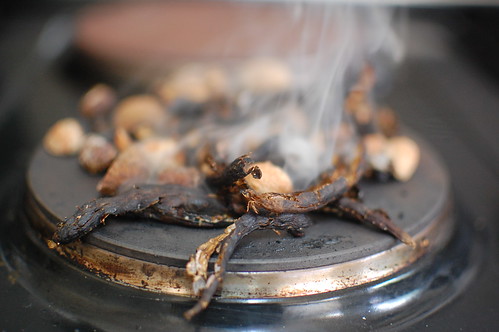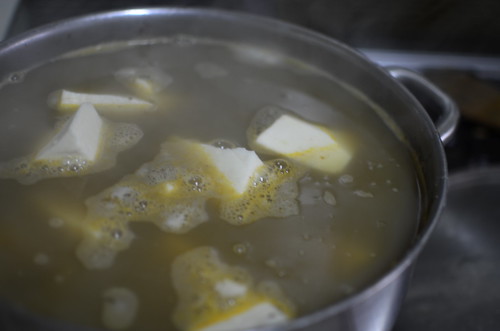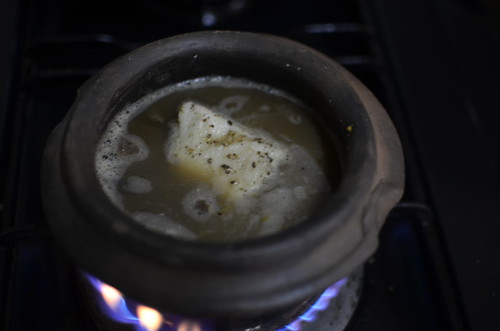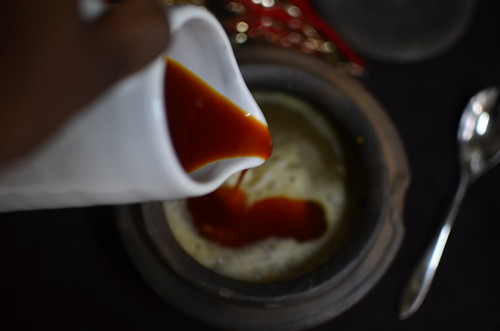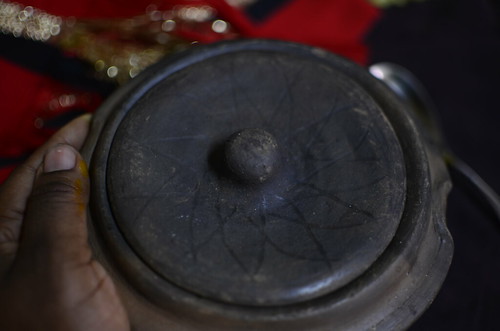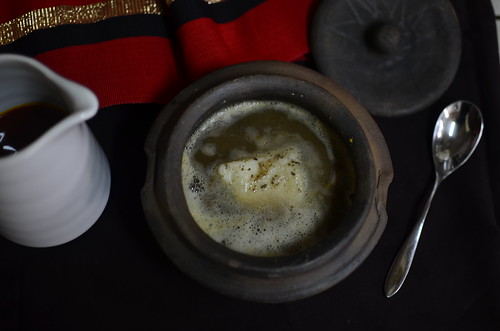
A night-time conversation with D, my 6-year old has brought me here, to this point where I am writing an open letter to the world. To those who think Nigerian cuisine is no more than pepper. And I am not really on the offensive. Or defensive. I’m just in plain agreement as to how we could have arrived here and also how we need to pick a new destination, a different one to journey to…in 2014 and beyond.
D and I are cracking the shells that encase seeds and spices, in preparation for whipping up a batch of pepper soup spice blend. Some residue is on his fingers and he tastes a bit, steps back and says ‘Peppery. Its peppery’. I smile and correct him, saying ‘spicy’ for pepper and spice are two totally different things.
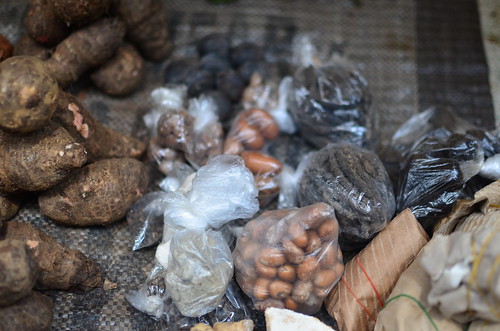
One is of the other – ‘pepper’ is a spice…and the other, ‘spicy’….as in spice embraces a larger world. Pepper is one instance, one dimension that is almost always characterized by heat. Fiery heat and not much else.
Whereas spice speaks of a plethora – a combination of flavours and fragrances, not just from one source but of many. Combine floral scents, with woody flavours, and nutty too. Add a touch of heat (sometimes) – that’s spice.
Nigerian food has been dismissed for centuries as being too ‘hot’, too peppery and therefore unattractive. After all who wants to eat a meal that’s no more than one ingredient, and for how long. But that’s not the whole story. I fear that recipe names have caused many to misjudge our cuisine. I understand it perfectly.
If I heard of a dish called pepper soup’ which is almost always spicy but not always peppery, would I stop to ask what it was made of? If there were more than peppers in it? I, too would take it at face value, and for many years I’ve done so with everything from Cassoulet to Bread pudding, but you know what? I stepped beyond the names, beyond the ingredients list….and got my mouth tasting what truly was. And that’s how validation comes about. First a theory, then a trial and finally a yes, or no.
If I saw Jollof rice for the first time, after hearing of ‘peppery soups’, I would be fooled into thinking it was all heat. And I would miss the complex smoky, rich, multi-layered and satisfying flavours that it holds within. I can’t go back and change history, and change names with it. I can’t overthrow my ancestors who in their wisdom named the names they did.
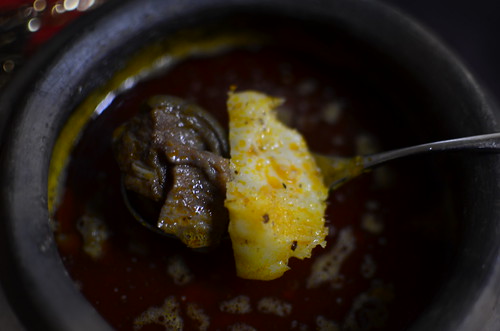
But I can, with a new voice for the present and into the future implore you all to give Nigerian cuisine a try. To try the recipe, and change it….how you like. How you desire. Make pepper soup, dial back a touch on the pepper, omit it all together if you like. Will that change what it is? The essence of it? No it won’t. All it will do for you is open up a new world of flavours.
And prove that when it come to heat, pepper isn’t always king. Lets make our own history. Explore for ourselves the true tastes of food. Not marred by bad memories, or biased by ‘them-says’ or ‘they-saids’, tales ferried on singular, unforgiving memories. And so I bring Ukodo to you today.
Ukodo is typical New Year’s day fare for breakfast/brunch dish eaten by the Urhobos in the south of Nigeria (The Itsekiris, also of the Niger Delta call their version Epuru). Like I proved this year.
Unlike the Dutch and their strict adherence to ‘pancakes for dinner‘, this dish is welcome any time of day.
It is essentially a pottage – a stew of meat and vegetable, with its base as the Nigerian pepper soup; with yams and plantains for vegetables.
I’d like the world to note that pottage and porridge are two different things. Like macarons and macaroons. Pottage: a stew, of meat and vegetables Porridge: a dish of cooked cereal, served sweet or savoury
Three years ago, when I first wrote about pepper soup, I used a ready-made spice mix.
I ‘swore’ that I would change that. That I would get the recipe off my mum. And I have!
March 2011:
All these ingredients and a few more are combined in a certain proportion, which only my mum and grandmum’s generation know…….. And that forms the spice mix which flavours water and turns it into liquid gold.
I have promised myself that when next I go home, I’ll sit with my mum to get the exact spice mix recipe so that I can teach my kids and carry the tradition. It would be a real shame if future generations did as I do now – ask my mum to send me a pack of already ground spice, or purchase a pack from the Nigerian shop in Holland Spoor.
The Spices and The Blend
My mom’s recommended Niger Delta pepper soup spice mix contains 4 essential spices: Calabash Nutmeg, Grains of Selim, ‘Gbafilo’ and ‘Umilo
For a total guide to each ingredient, read the original ‘How to Make Nigerian Pepper Soup’ post
There are a few more optional spices, to add as desired – Yanghanyanghan and others. But I don’t think them necessary. If they are to be used, a teaspoon full would be the perfect addition to the
To make the spice mix once they’re prepared, you ‘toast’ them till the fragrance starts coming through, and then you blend them into a mix with some dried crayfish.
Calabash Nutmeg
Local Names: Erhe – Urhobo; Iwo – Itsekiri; Ehuru – Igbo; ? – Yoruba

Consists of: Shell and seed. Parts Used: Seed.
Grains of Selim
Local Names: Urheri – Urhobo; Unien – Bini; Atta – Ibibio/Efik; Uda – Igbo; Eeru – Yoruba
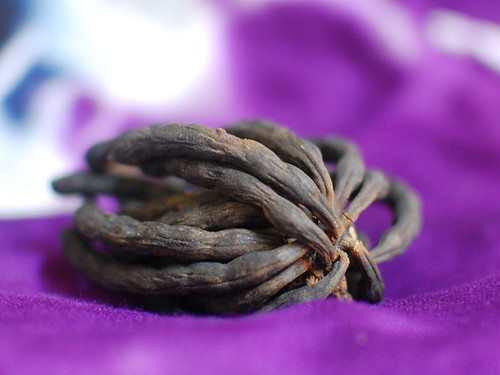
Consists of: Skin and seeds. The seeds are bitter and my mom discards them. Parts Used: The skin
Gbafilo
Botanical name: Parinari excelsa (Mubura)
Local Names: Gbafilo/ Gbafilor/ Igbafilo– Itsekiri
Consists of: Shell and seed Parts Used: Shell is broken and seed inside is used.

Umilo
Local Names: Omilo/ Umilo – Itsekiri
Botanical name: Chrysobalanus icaco
And out of interest, in Brazil, it is known as Grageru or Abageru
Consists of: Shell and seed Parts Used: Shell is broken and seed inside is used.
To prepare the Pepper Soup Spice Mix
Prepare the spices in the following proportions, and feel free to scale up as you will, keeping the following proportions:
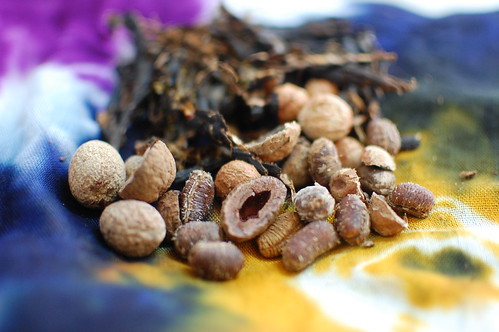
Toast the spices in a skillet, on the hob or hot plate for a couple of minutes.
Once you can smell the spices, remove from the heat and set aside. Allow the spices to cool down.
Then in a spice mill, process till you have a relatively homogeneous blend. Put in a jar and refrigerate, or stash in the deep freezer.
How to Make Ukodo
This is an update on the How to make Nigerian Pepper Soup post.
Though Ukodo and Pepper soup have essentially the same ingredients, there are a few key differences:
1// In Ukodo, you NEVER use bouillon/stock cubes, like you do in pepper soup. Instead, you use native salt, Ughweri to ‘season’ it. This salt is rock salt – yes, without iodine – for occasional use. It is clearly salty, with a distinct sour note to it.

There are other salts too that are available for use. Like the crystalline one below, which I added a mere pinch to the soup. 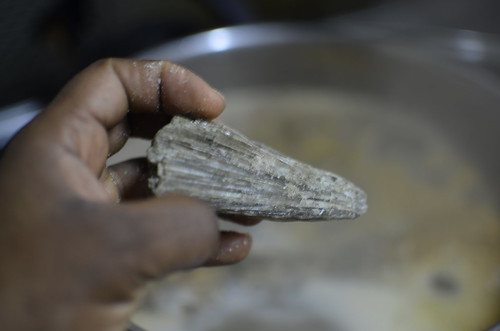
2// Ukodo is a one-pot wonder and a thickened version of pepper soup. The yam and plantains, if used (and as in a real pottage) are cooked in the soup, unlike in pepper soup where they are cooked separately, and served on the side.
Ingredients
2 kg goat meat, preferably the more fragrant he-goat, cut into bite-sized pieces 4 – 5 litres of water 2 – 3 heaped tablespoons of pepper soup spice mix 4 – 5 lemon grass leaves, bruised by rubbing between your palms and tied into a bundle Native salt, about 1/2 a teaspoon or to taste 2 tablespoon dry pepper (red chilli flakes) or, to taste Fresh yellow chilies, split in half (to be fished out once cooked) Nigerian yam, peeled and cut into chunks , about 8cm lengthways 2 teaspoons of ground crayfish (optional) 1/2 young lime leaves (optional)Many Nigerian cooks prefer to use the tastier, more fragrant and softer he-goat when cooking. The she-goat is tougher, and typically takes a long time to cook.
Also, we tend to leave the skin on the goat meat as well.
Directions
Put goat meat, water, pepper soup spice mix, lemon grass, salt, dry pepper, yellow chilies (if using) and ground crayfish into a large pot. 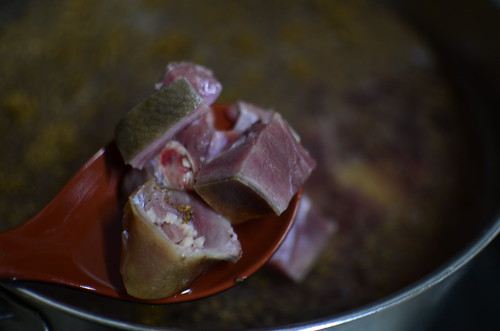
Bring to the boil, then turn down to simmer for 30 – 40 minutes putting a lid on till the meat is halfway cooked.
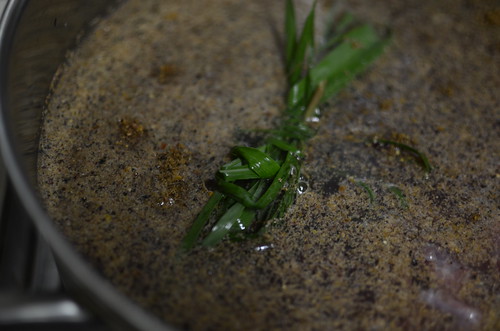
Add a bit more water, check for seasoning to suit your tastes. I like mine with the clear pepper soup spice flavour coming through and a constant heat from the red chili flakes. Add the chunks of yam and cook till the yam is soft – a knife or fork inserted into a piece should slide in with ease.
Once the yams are cooked, remove them – they will go back into the pot just before serving. Otherwise, they absorb a lot of the soup liquid, get really soft and mushy and disintegrate.
Also fish out the lemon grass leaves. Discard.
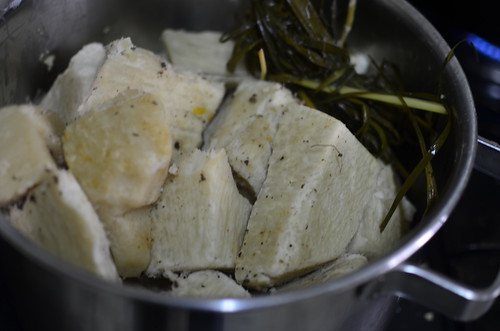
You want a thickened soup not as thick as yogurt but not as thin as liquid milk. To accomplish this, you may need to mash up or blend a piece of yam to thicken it.
Check seasoning – salt, chili – adjust as required then add lime leaves, if using.
Turn off the heat and set aside.
When you’re ready to serve, put the yam back in – heat through, warm through till the soup is heated through and the yam is hot, then serve in a seasoned clay pot or in a regular serving dish.
Top with palm oil…..

…..and feast.
Verdict
For me the most remarkable thing about this dish, Ukodo is the mouth feel which I can only describe as luxurious. A combination of the gelatin in the meat bones and the native salts result in a smooth, ‘rich’ feel that’s perfect – not over powering and definitely not required in small doses only.
The second amazing thing is how the palm oil transforms the tastes – binds the already cohesive yam and soup elements but makes them more ‘wholesome’. Brings depth. And flavour.
Of course how much palm oil you use is entirely up to you.
But…it isn’t something I’d like to skip.
And finally, I thoroughly enjoy the softness and spiced flavour of the yam.
This was a good pot of soup.
A great one to kick-start 2014.
All my love to you and yours and the VERY best wishes for the year ahead.
Did you cook any typical New Year’s dishes? Are there traditions associated with them? Pray, tell.
With love X X X


